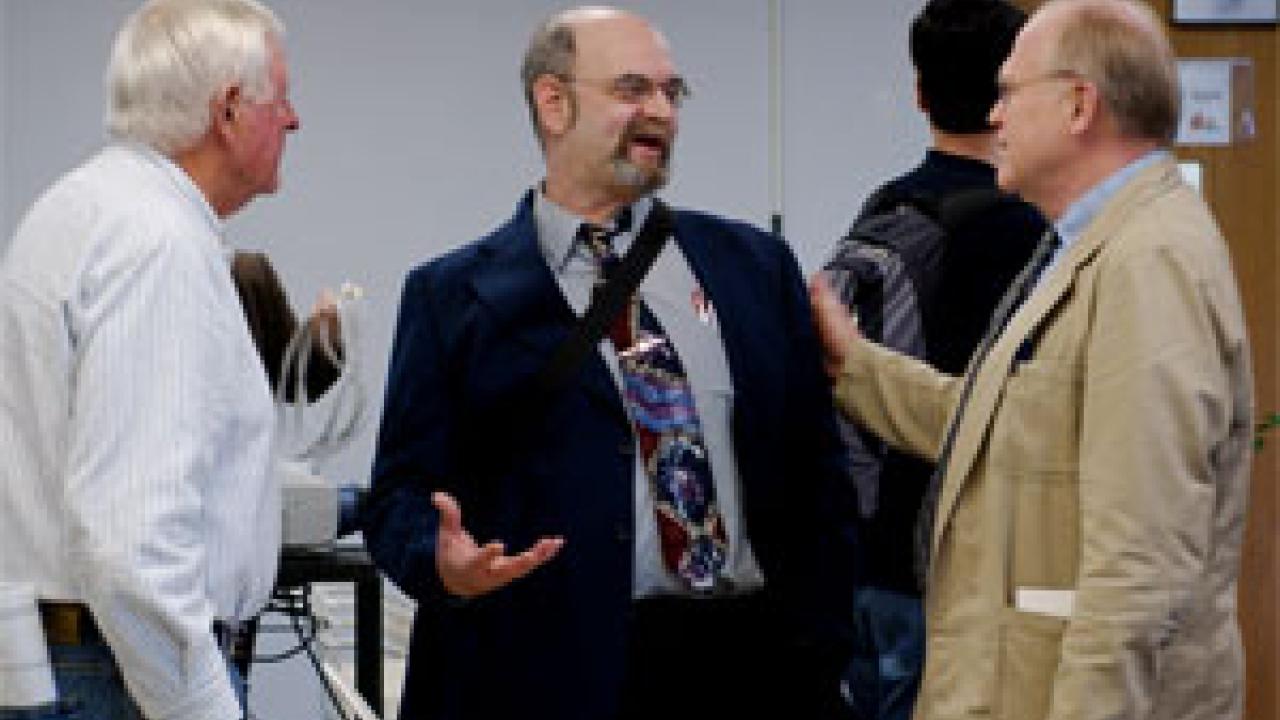Chancellor Larry Vanderhoef says the state of the campus looks brighter than a year ago on issues like the budget and collaboration between faculty and the administration.
Vanderhoef, in his annual address to the UC Davis Academic Senate on Feb. 28, said that Gov. Arnold Schwarzenegger's proposed budget will "help us turn the corner to greater financial stability," despite concerns about "flat or declining federal budgets and a not-yet-healthy state economy."
The governor's budget calls for a $97.5 million increase in state general funds for UC operations, or 3.6 percent, over the 2004-05 fiscal year. Previously, over a four-year period ending this year, UC had taken a 15 percent cut in state funding while also seeing a 19 percent increase in enrollments.
Before about 100 faculty members in the Memorial Union, Vanderhoef noted that the governor's budget would support a 1.5 percent general salary increase for all eligible employees, funding for faculty and other academic merit programs, and a 1.5 percent merit-based increase for eligible staff.
One trouble spot is lagging faculty salaries -- UC faculty salaries are now estimated to be 8-10 percent below those at comparable institutions.
"If the governor's budget holds," said the chancellor, "we will be able to begin addressing that shortfall."
Beyond the budget, Vanderhoef cited other reasons for optimism, including UC Davis' 14th ranking among all U.S. universities in overall research funding, nationwide media coverage, a campus building boom, and the upcoming West Village neighborhood for faculty, staff and students.
Both the chancellor and Provost and Executive Vice Chancellor Virginia Hinshaw recently participated in a series of small statewide gatherings of key UC Davis friends and supporters in preparation for the upcoming comprehensive fund-raising campaign -- and that experience was both informational and motivational.
"They challenged us to make a convincing, passionate and unique case for private support for the campus they feel so very strongly about," Vanderhoef said.
While UC Davis has much work ahead in this multi-year fund-raising undertaking, he said, the campus will benefit from all the "good will to draw upon as we focus our efforts and strengthen the culture of philanthropy at UC Davis."
Regarding the upcoming comprehensive campaign, Vanderhoef pointed to recent survey research that indicates faculty, staff, students, parents, alumni and the general public view UC Davis as a "dynamic institution on the rise."
Vanderhoef added, "a majority of our alums also said they viewed their relationship with their alma mater as one of 'family.'"
On the issue of shared governance, Vanderhoef also touched upon the Academic Senate's recent report on the matter. "I wholeheartedly agree with the aims of the report -- to move the campus to the highest possible levels of academic excellence through the good-faith exercise of our shared responsibilities," he said.
At UC, the concept of "shared governance" means that faculty makes the final decisions on admissions, courses and curricula and graduation requirements; the administration has authority over resources. But on everything related to these and other matters, the two entities must consult.
Vanderhoef said progress on this collaboration is being made in "areas where we need to work together," including the budget, graduate student support and time-to-degree. He noted that the provost and Office of Resource Management and Planning are working closely with faculty leaders to design a process for analyzing budget proposals -- both at the college and school level and at the campus-wide level.
"We won't always agree," said Vanderhoef, "but I hope we can always feel understood by the other and assured that we've each done our best to safeguard the long-term best interests of this university, our university."
Also, the chancellor urged the faculty to increase international study opportunities for students. "I feel so strongly our responsibility to prepare our students to be world citizens," he said, "and providing a quarter of international study need not necessarily delay a student's progress toward degree."
In other business, the Academic Senate voted to reinstate a former doctoral student in genetics, Howard Zochlinski, who had been disqualified from graduate studies in 1993.
In approving the petition for reinstatement, the senate resolved that Zochlinski may not have received a fair and full hearing on prior bids to re-enter the program.
During his undergraduate days as an anti-Vietnam War activist at UC Santa Barbara in the 1970s, Zochlinski was arrested three times -- in each case the charges were dropped. In 1984, he entered the genetics graduate program, and had some extensions for his dissertation. In 1992, he was arrested again -- by the same police officer who had arrested him 20 years earlier. The charges were also dropped this time.
In January 1993, after nine years in the genetics department, Zochlinski was dismissed from the program for failing to file an acceptable thesis by the deadline his dissertation committee had assigned.
"I'm flabbergasted," said Zochlinski after the vote, "I've waited 13 years for this. Thank you all."
Media Resources
Clifton B. Parker, Dateline, (530) 752-1932, cparker@ucdavis.edu
